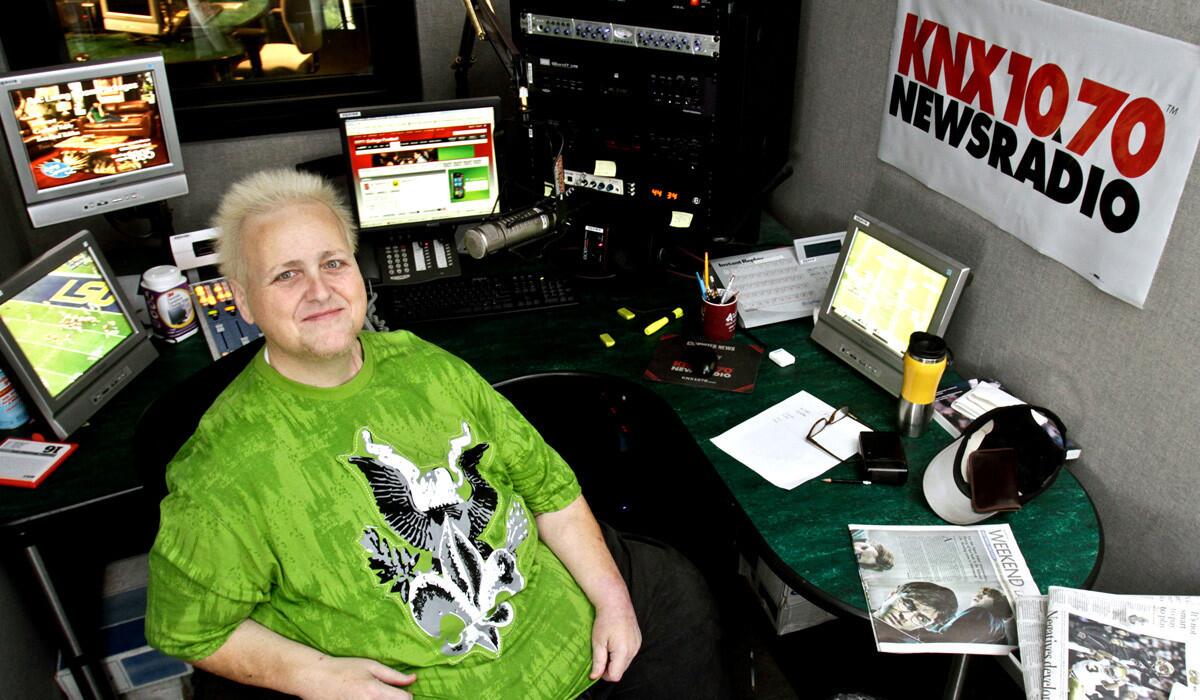Remembering Joe McDonnell, the one and only

- Share via
I had a scoop. Man, I had a scoop. Little ol’ me from the San Bernardino Sun.
Found myself the only media member in the Dodgers clubhouse on that Sunday morning in the final game before the 1990 All-Star game when I heard the explosion. Manager Tommy Lasorda had his office door closed, but you could still hear the screaming in the clubhouse.
I turned to ageless clubhouse attendant Mitch Poole and asked incredulously, “Is that …?”
“Gibby,” he said in a whisper, like saying it aloud might bring the wrath of the baseball gods down upon him.
Someone was screaming back. It was General Manager Fred Claire. I looked around the clubhouse. It was just me, Poole and a couple of players. The shouting went on and on. What a scoop!
Then Joe McDonnell walked into the clubhouse.
And there went that big scoop. He caught the end of the scream fest, figured out what was going on and had it on the radio before I got back up to the press box. Now everyone had the story, thanks to Joe.
All I could do was shrug. Joe was on the scene again, like he seemingly always was. I couldn’t get upset with him. Well, maybe I should say I could never stay upset with him.
We started in the L.A. media business around the same time, both covering the Lakers when the Showtime Era ignited. Heck, Joe covered everything. At the Forum, when the NBA still valued the media, the press sat along the east baseline. The Sun’s seat was the very last one on the left, and Joe, much too large a man to sit in a normal press seat, had a chair provided by the Lakers right next to mine at the end of the table.
We’d bicker about everything during games. As I recall, I won every argument. Michael Cooper’s makeup, Kareem Abdul-Jabbar’s rebounding, Pat Riley’s hair, hottest Laker Girl. I’d usually wait for him to offer an opinion and then take the opposite view just to get him going, because that was so hard to do.
He had a way of ingratiating himself with players, particularly those most found difficult to deal with. I could never talk to Eddie Murray about anything but the Clippers. Joe would sit down and talk to him for an hour all the time. Gibson loved him, neither taking an inch from the other. Joe could go back and forth with a player like no one else. He developed relationships. And nobody worked harder.
When he became a sports talk radio host, it was a natural fit. If you had a topic, he had an opinion. He was pretty much the guy you heard on the radio all those years, just a little less bombast and a lot more sweetness.
I saw less of him when his job required him to be more in the studio. The radio world can be a tough, brutal business. He had some amazing ups and downs. But he easily broke more stories than any other combined five radio guys in town.
He had gastric-bypass surgery and lost 400 pounds. Battled flesh-eating bacteria for years. Got married. Got laid off. And still made it to the press box, in whatever color he had selected that day for his hair or goatee. He was nothing if not an original.
Every press box, locker room, dugout and clubhouse in town welcomed Joe. He had a presence beyond his size. The big man with the bigger heart passed away Friday and the Los Angeles sports scene will forever be sadder for it.
He was an absolute character with a laugh that was more than infectious, it almost demanded your body join in. You had to laugh with Joe, even if you’d lost a scoop.
More to Read
Are you a true-blue fan?
Get our Dodgers Dugout newsletter for insights, news and much more.
You may occasionally receive promotional content from the Los Angeles Times.








